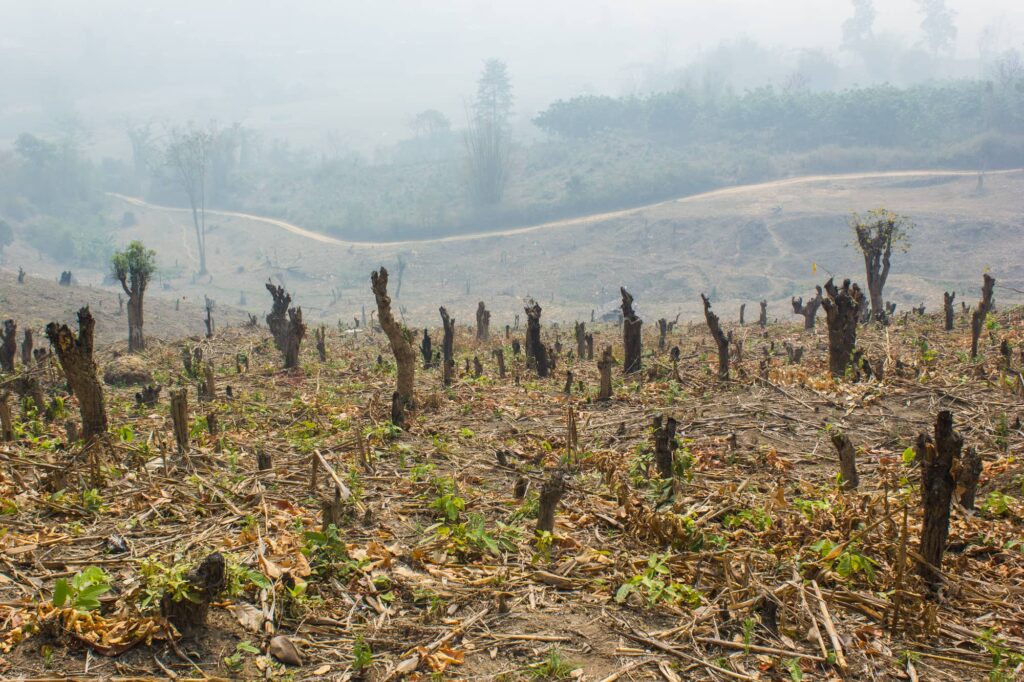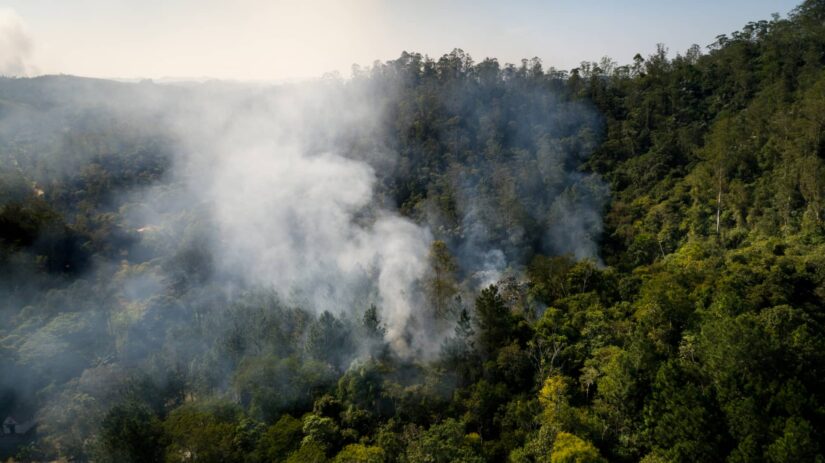Brazil’s Amazon Deforestation Hits Record High in April
As per reports, Amazon deforestation in Brazil during April was the highest in the last five years for that month. This is surprising, especially after Brazil President Jair Bolsonaro’s pledge that his government is determined to invest more resources for limiting deforestation. There has been a 43% increase in deforestation compared to April 2020. These statistics have been provided by the government’s Deter monitoring system that uses satellite images to give deforestation alerts.
The President reaffirmed at the climate summit led by the US that he was eager to stop deforestation but was in need of outside financial help for the purpose. But, the world is closely monitoring Bolsonaro since he had previously declared that there was a necessity to tap Amazon’s resources. He had opposed European leaders who were in favour of protecting the rainforest.
The reports about April’s Amazon deforestation are disturbing since they show that unlawful forest activities are increasing.
Amazon Deforestation and its Effects on the Environment
Deforestation is a serious environmental issue today globally. It is brought about by uncontrolled human activities and natural causes like forest fires or disease to trees caused by parasites.
Massive deforestation has a negative impact on the climate, natural ecosystems, and biodiversity. Studies reveal that most of the deforestation is a result of agriculture expansion. Other reasons include mining activities and the construction of dams or roads.
These are the main effects of deforestation:
1. On Biodiversity
Deforestation negatively impacts biodiversity. Forests are home to different species of animals, plants, insects, mammals, and birds. When people destroy forests, they create natural imbalances, endangering the survival of animals and plants.
2. On Local People
Most of the local people depend on forests for their livelihood. Their main source of food comes from forests, and they procure their raw materials for their small businesses from these forests. When these forests are exploited for businesses and other purposes, the livelihood of the locals gets affected.
3. Climate Change
Deforestation is also a big contributor to climate change. Trees store a lot of carbon dioxide, and when large numbers of trees are cut, they send back the CO2 into the environment. With the decreasing forest cover, there will also be lesser trees to absorb the CO2 from the atmosphere.

The Significance of Amazon’s Rainforests
Amazon’s rainforests are rich in natural resources, which are vital not only for the local community but also for the entire world. With the continued deforestation, we are in danger of losing this vast resource that means a lot to future generations.
A brief look at the natural resources in Amazon will provide a clearer picture.
Natural resources in Amazon
- Peru is abundant in gold, silver, copper, zinc, and tin. However, unregulated mining activity and dumping of mercury into the Amazon have been the cause of great worry.
- The great Amazon river is a significant source of freshwater needed for agriculture, food, and other purposes. The water is home to thousands of species of fish and other marine life. Potentially, Amazon deforestation is a huge threat to the water cycle balance in the region.
- Amazon is also rich in plant species that are recognized for their medicinal value. They are used to treat diseases like malaria and are even believed to have anti-cancer properties.
- The Amazon rainforest is believed to contribute about 20% of the earth’s oxygen. The forests also take in a lot of the carbon dioxide emitted by human activities. By destroying the forests, we are in danger of losing our best weapon against climate change.
- The region is also a great supplier of food, such as coffee, bananas, tomatoes, potatoes, and black pepper, to other parts of the world.
Destruction of forests can heavily impact human lives and the environment in the coming years. The world needs to come together to create laws and policies to protect forested areas like the Amazon. The latest statistics concerning Brazil are alarming, indicating an urgent need to curb Amazon deforestation to preserve the forest’s natural resources.
Plastic Collectors have been actively contributing to preventing environmental pollution all over the globe. They encourage people worldwide to collect plastic waste and offer them more than the market price as an incentive. These plastic collectors can exchange their raw material for money or other essential items. Through this excellent initiative, Plastic Collectors has been instrumental in transforming the lives of many of the poor people in the world. It has also been effective in preventing plastic waste from polluting the oceans. Click here to join us.
Recent Blogs
- The Role of Recycled Plastic in Enhancing the Durability of Natural Disaster Kits
- Beyond Recycling : Why We Need Comprehensive Solutions to Tackle Plastic Pollution
- Which Are the Items that Cannot Be Recycled
- A Research Detects Plastic Fibers In Tap Water All Across The World
- Let’s learn to travel without plastic
- Role Of Plastic in Sustainable Development
- Plastic Offsetting Schemes For Business
- Ways You Can Restore Nature
- Say No to Plastic in Automotive Application
- Top 5 Environmental Issues That the World Should Focus on in 2021
- How are plastic plates threat to our health?
- How can you reduce plastic waste at home
- How is Plastic Made? Plastic Production Process Simplified
- Jules Thin Crust – Setting an Example for Zero Waste Restaurants
- Plastic Free Essentials to tackle Covid
- 5 oral alternatives to plastic oral hygiene
- Best Alternatives to Plastic straws
- Secrets to Dishwashing Habits Without Plastics
- Ways To Make A Difference To Ocean Plastic
- All You Need To Know About EPBC Act
- Best Ways to Reduce Plastic in School
- How can you reduce plastic in your workplace?
- Ultimate Reasons We Need Less Plastic More Nature
- Single-Use Plastics Will Be Banned Under New Plans!
- Why Are Plastic Microbeads Banned in the UK?
- Is Amazon Responsible for Generating Nearly 600 Million Pounds of Plastic Packaging Waste?
- Yippie! Beach Litter at Its Lowest in 20 Years Due to Plastic Bans
- Government plans to ban single-use plastic plates, cutlery, and cups
- Are supermarkets playing a vital role in cutting plastic?
- Is Silicone Biodegradable?
- 7 Unknown Facts About Plastic
- 10 Most Dangerous Plastic Products For Marine Life
- Potential Benefits Of Using Recycled Plastic
- What are the different types of plastic?
- Recycling is not the Permanent Solution for Plastic Pollution
- Is Bioplastic environment friendly?
- The Harmful Effect Of Drinking Water In Plastic Bottles
- 10 alternative for plastic items for everyday use
- The growing problem of ocean plastic pollution due to COVID-19
- Plastic Declared Toxic Under Canadian Environmental Protection Law
- Brazil’s Amazon Deforestation Hits Record High in April
- Climate Crisis Will Lead to The Sea Levels Rising by at Least 20ft
- Spring Energy Efficiency To-Do List 2021
- Wildfires and Climate Change: How They are Connected
- Climate Change Likely Behind Himalayan Glacier Collapse
- World’s Oceans Continue to Warm, Despite Reduced Carbon Emissions
- UN Chief Calls for Urgent Transition to Renewable Energy
- Greenhouse Gas Emissions could Lead to 4C Warmer Cities by the Century’s End
- Biodiversity Loss: Hunger Rising in Mountain Regions
- UN to Create Global Coalition for Carbon Neutrality in 2021
- Environmental Pollution Study – Air Pollution Leads to More Plastic Waste
- Air Pollution Effects: 11% Higher Risk of Death from COVID-19
- Environmental News: How the US Election Could Affect Climate Change
- Water Pollution Effects: Consequences of Water Pollution
- Water Pollution Solutions: 5 Simple Things You Can Do
- Plastic Straws Ban: England Officially Bans Plastic Straws
- Environmental Conservation: Why You Should Become a Volunteer
- Climate Change News: New Method of Measuring Ocean Warming
- The Causes and Solutions for Global Warming
- Global Warming News: The Effect of Global Warming on the Arctic
- Climate Change Solutions: Things you can do to stop Global Warming
- 5 Shocking Climate Change Facts You Need to Know
- Waste Reduction Strategies For Your Business
- Marine Pollution: How It Can Be Controlled
- How Are Plastic Bottles Recycled?
- A Beginner’s Guide to Sustainable Living
- 10 Shocking Facts about Ocean Pollution
- What are Microplastics and why are they so harmful?
- Bioplastic – Can it really solve the plastic problem?
- Great Pacific Garbage Patch: Everything you need to know
- Where Does All the Plastic Waste Go?
- Top 5 Countries Producing the Most Plastic Waste
- Uses of Recycled Plastic : What Plastics Can Become
- 7 Types Of Plastic That Are Harmful To Our Health
- Top Eco-friendly Alternatives to Plastic
- Plastic on Beaches : How to organize a Beach Cleanup
- Plastic Bag Bans Around The World – Are They Truly Effective?
- Plastic Eating Bacteria: Is it the Solution to Plastic Pollution?
- What Is ABS Plastic And Is It Recyclable?
- How To Recycle Plastic Bags?
- 10 Plastic Pollution Facts That Show Why Tackling The Plastic Problem Is Essential
- How Much Plastic Is In The Ocean And How Does It Affect Marine Life?
- A Beginner’s Guide to Plastic Recycling
- Six Common Myths About Plastic Pollution Busted
- How to Reduce Your Plastic Footprint in 2020
- The quality of life and poverty in the Philippines
- Plastic problem in Thailand
- What is plastic and why is it so harmful!?

